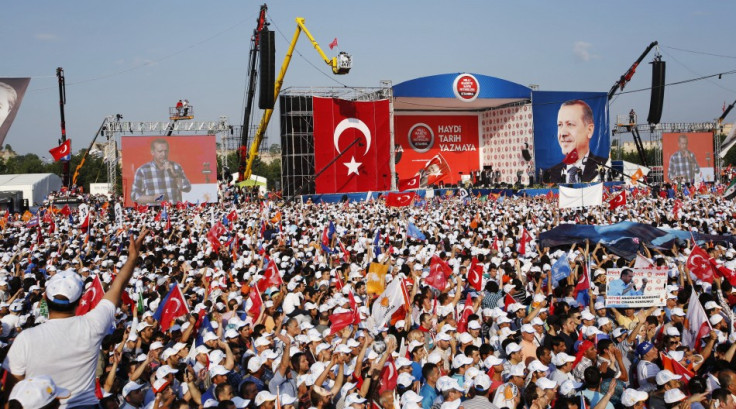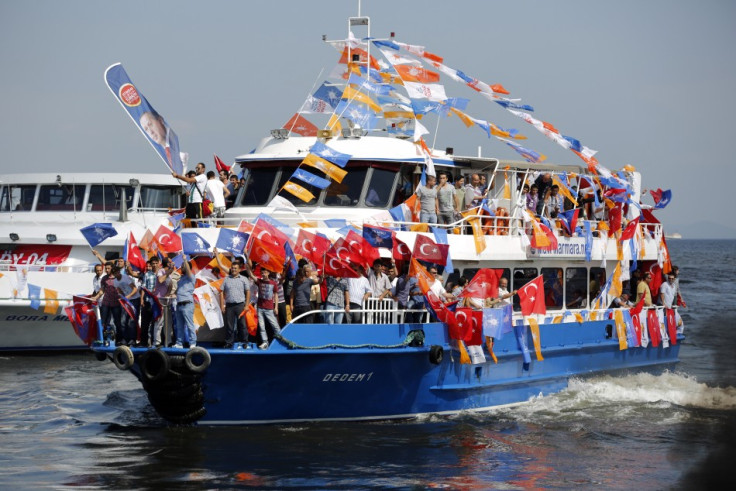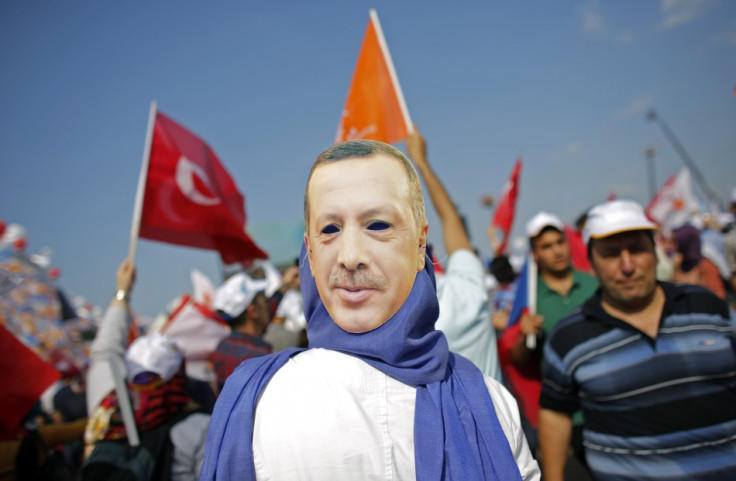Erdogan's Seaside Rally in Istanbul Raises Spectre of Civil War in Turkey [BLOG]
As PM supporters rally in tens of thousands, is Turkey descending into war?

Since the early hours of Sunday morning, dozens of municipal buses have been escorting thousands of people to the Istanbul suburb of Kazlicesme for a rally in favour of premier Recep Tayyip Erdogan.
Even the "vapur" - ferries used to carry people from one side of the Bosporus strait to the other - have been adorned with flags of Erdogan's Justice and Development Party (AKP) and used to convey the demonstrators.
While clashes between police and anti-government protesters continue in the popular neighbourhood of Besiktas, the luxury area of Nisantas and historical Istiklal, Erdogan paints a completely different picture to the TV cameras.
The stage is set just in front of the sea. To the left, the Turkish flag, to the right, a giant picture of Erdogan himself. To the centre, tens of thousands of demonstrators - 1 million according to the PM, 200,000 according to other reports - with hundreds of flags. At some point, a huge banner with Erdogan's face covered the square.
The main character, instead, is dressed modestly. He wears the same check shirt that in the past granted him the nickname of "man of Kasimpasa", the poor neighbourhood from which he heralds.
As demonstrators say, he appears like "one of them" - "biz den biri "in Turkish.
The PM lashed out against social media, insisting they will not "make our nation sick", and slammed international media outlets which are "blind in front of massacres in Palestine" but follow what happens in Taksim minute by minute.
"If the international media want a picture of Turkey, the picture is here," he said. "CNN, Reuters, BBC, hide this picture too, and go on with your lies. Turkey is not a country on which international media institutions can conduct operations."
The real Turkish spring
In his speech, Erdogan was quick to clarify that "this is not a Turkish spring", referring to the protests that started as peaceful, small demonstrations to save a rare green spot in Istanbul's Taksim Square but mushroomed to anti-government, large-scale protests against the perceived authoritarianism of the country's prime minister.
"We had a Turkish spring, but it is dated 12 November 2002," Erdogan said after the first electoral victory of his Justice and Development Party.
Erdogan stresses that in his rally "you will not see Molotov cocktails and you will not see clashes. What we have to say, we say it in a democratic way, in the places where the law allows us to demonstrate.
"We - are not against the law," he adds, taking a breath between the 'We' and the rest of the phrase to underline a growing crack in Turkish society. The premier attempts to portray himself as a peacemaker bringing calm to Turkey's violent clashes, insisting: "I have listened to them [the protesters], they came to me with their delegations."
Who are the real Vandals?

Erdogan asks viewers and spectators to look at the facts "for what they are".
"Who are the 'capulcu' [the word for looter used by Erdogan to label the demonstrators and quickly adopted by the demonstrators themselves]? Who are the real Vandals?" he asks.
Although many have condemned the response of Turkey's authorities to the protests, which have left five demonstrators dead and 5,000 wounded, Erdogan says the police reaction "was just due", claiming: "Around 150 police cars have been burned. More than 200 cars destroyed. The Atatruk cultural centre has been occupied. They have entered a mosque with their shoes on, they have attacked our sisters with head veiled."
Against the opposition
Erdogan also accused the opposition CHP party of unlawfully participating in the demonstrations.
"Two CHP MPs took part in the Ankara demonstration yesterday," Erdogan said with a populist rhetoric. "Lawmakers should not offer a pretext to the people who want to bring us terror".
He also accused nationalists of "putting Ataturk's flag side by side with a terrorist one", referring to the jailed leader of the Kurdistan Workers Party (PKK) Abdullah Ocalan. His tough, dangerous words may put the peace process with Kurds at risk.
I am not a dictator
The prime minister rejects accusations of authoritarianism. "What kind of dictator allows environmentalists to demonstrate? Ten years ago these kinds of demonstrations were not allowed. Ten years ago journalists could not write freely what they want. We have removed these restrictions," he said.
The country is with him, in that square, according to Erdogan. "If you want to understand Turkey, if you want a real photograph of this country you have to understand AKP, only then you'll understand the truth," he said.

On the verge of civil war
On Sunday, it became clear that there is deep crack between Turkey's two, equally strong souls. The fate of this iron fist is unpredictable, but there are external factors that can change the destiny in favour of one or the other parts. The peace process with the Kurds, the market instability, the attitude of Obama and the other international forces can sway the country's fate on one or the other pole.
But the spectre of a terrible civil war is increasingly close at hand, if not already a reality.
Emanuela Pergolizzi is an expert in Turkish affairs. She has published an essay entitled "AKP foreign policy: a 'neo' or 'post' Ottoman recap?". From 2013 she covered the peace process between the Turkish government and Kurdish jailed leader Abdullah Ocalan. She writes for Osservatorio Iraq and Resetdoc.
© Copyright IBTimes 2025. All rights reserved.





















